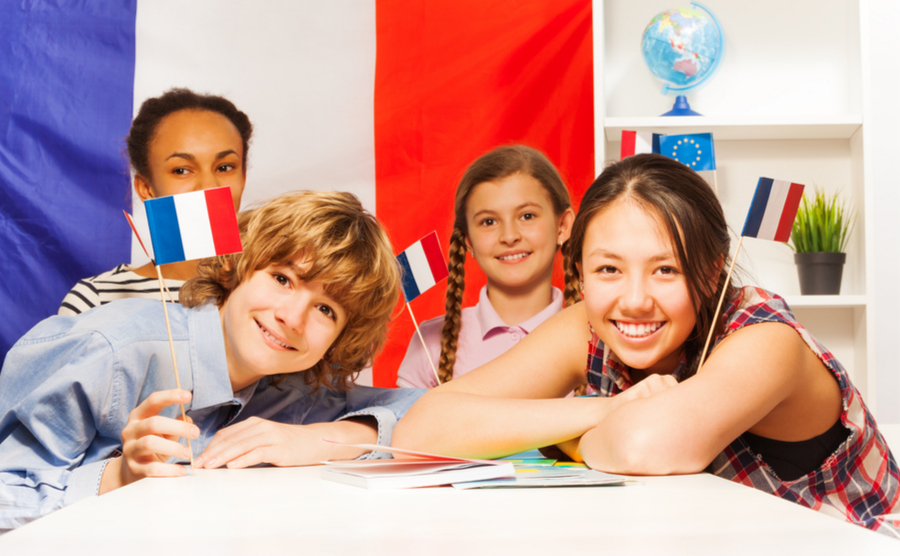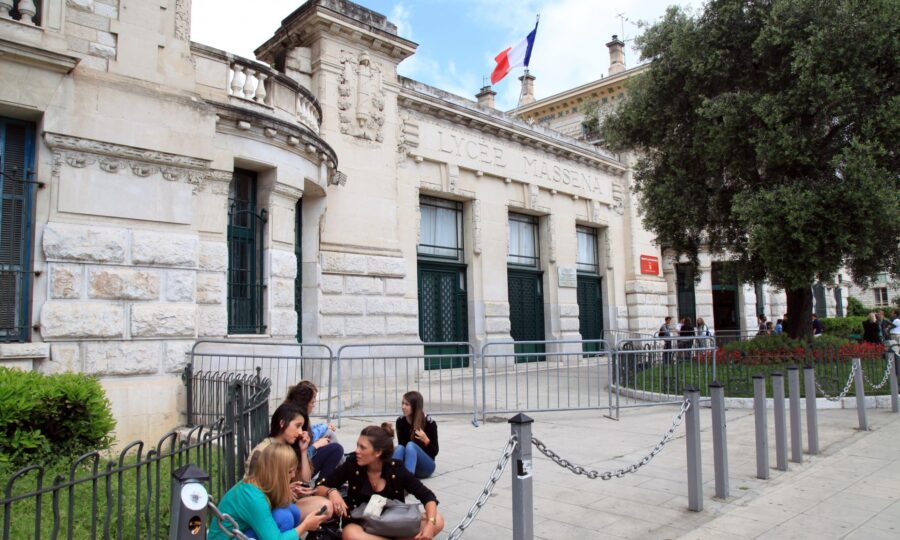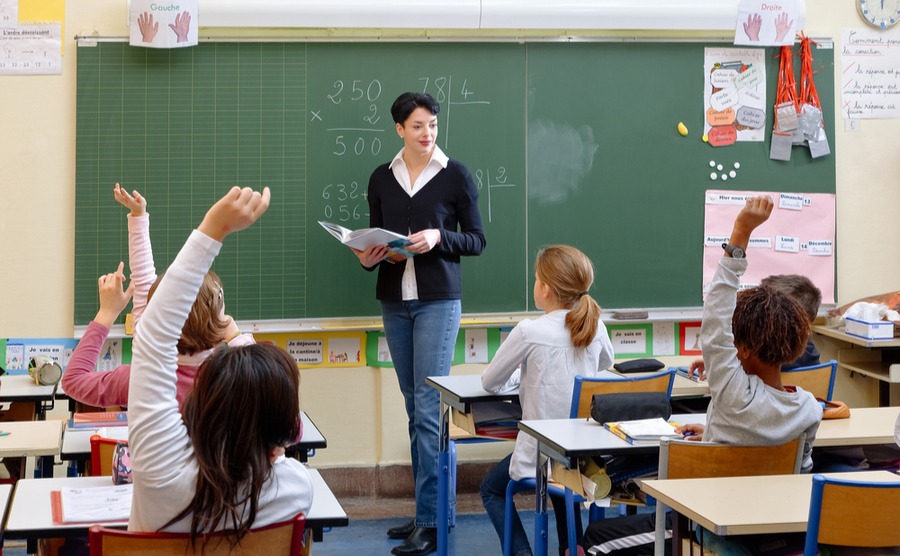The French educational system is one of the best in the world. Generally speaking, it is based far more on the academic core subjects with slightly less emphasis on sports and arts. Having said that, there is still plenty of excellent teaching in the latter category, it is just that the French have always placed greater importance on academia.

Children in a French school holding the state flag
Find homes in France via our property portal.
How does the French education system differ from the UK?
Children in France are expected to start school at age six, although younger children can go to nursery from around 3 years old. There is no school uniform in French schools and normally teachers are monitored by the local education authority rather than being held accountable to a head teacher.
Schools are secular apart from Catholic schools which are deemed to be private. You’ll also find there are some high fee-paying private schools dotted across the country. As a rule, the state schools offer a first-class education.
Insurance is mandatory for pupils in France. Parents need to pay “assurance scolaire” which is normally not overly expensive and welcomed by many, since parents then receive an allowance per child for paying for school essentials such as books, stationery etc. This covers your child/children in case they hurt themselves or for any damages they may cause. Learn more about assurance scolaire here.

The school timetable from 6-18 years
Education is mandatory for children from the age of 3 until 16. There are 4 tranches as follows:
- Ecole maternelle: ages 3 to 6
- Ecole elementaire: ages 6 to 11
- College: ages 11 to 15
- Lycee: ages 15 to 18
Enrolling your child in school
Primary schools in France are localised meaning your child will be assigned to a local school when you register in France. You can request a specific school but it will have to be in your catchment area unless there is a legitimate reason.
State primary schools are free and co-educational, therefore parents are only required to pay for children’s lunches, class outings and any after-school care they need. As stated, the core subjects are deemed the most important and a foreign language, usually English is taught from a young age.
The school year
The school year runs from September to June or early July. There are five holiday breaks during the academic year and the dates of these vary across different regions. This is to avoid the entire country being on holiday at the same time! Children need to enrol in their school by June at the latest for the September start.

Private schools in France are more affordable than their UK counterparts and are very popular with expats.
Popular international schools in France
There are several international schools dotted across France, some state, some private and the following are all considered high quality and may be worth looking at if you are moving to France with children. The list is by no means exhaustive!
Marseille
Cité scolaire Marseilleveyre: A state secondary school that teaches international students in English as well as other languages. Learn more here.
International School of Marseille: The second is a private bilingual school. Visit the website.
Lyon
École cite scolaire internationale: A state school offering classes in various languages including English. Visit the website.
Toulouse
College and Lycee Victor Hugo: Located in Colombiers just outside the city. Visit the website.
Nice
College and Lycee International Valbonne: A state school. Visit the website.
Nantes
Cite scolaire Grand Air: A state secondary school with a British section. Visit the website.
Montpellier
École Bilingue Internationale: A bilingual private school set in the grounds of a chateau! Visit the website.
Bordeaux
Bordeaux International School: A private international school with bilingual education from nursery to secondary school level. Visit the Bordeaux International School site here.
Lille
École Jeannine Manuel: A private school offering a bilingual education plus other languages. Learn more about École Jeannine Manuel here.
Paris
Unsurprisingly the majority of France’s international schools are situated in and on the outskirts of Paris. In addition to private international schools, there are plenty of state schools which have international sections.

The children enjoy plenty of activities and trips in the French school system.
General information on the schooling system in France
The school day generally runs from 8.30 am until 4.30 pm which is longer than in the UK but the lunch breaks are longer and most schools have 2 other short breaks during the day.
Some primary schools have no classes on Wednesdays and local authorities often offer activities instead of school for part of the day.
Lunch breaks are normally one to one and a half hours and pupils can eat at school or go home rather than bring their packed lunch.
Classes are quite large: generally around 30 pupils as in many European countries.
Foreign language teaching starts at the primary school level – something which the UK could well learn from! Normally there is a choice of English, Spanish and German as a second language.
Education is secular in France so you will not find any religious studies on offer.
A British child of 8 or under will very quickly pick up the French language and although it may seem tough at first, most children adapt very quickly to their new surroundings. France is a country which offers a great opportunity for young people of all ages and as an expat, you will likely be spoilt for choice in deciding where to send your child to school.










